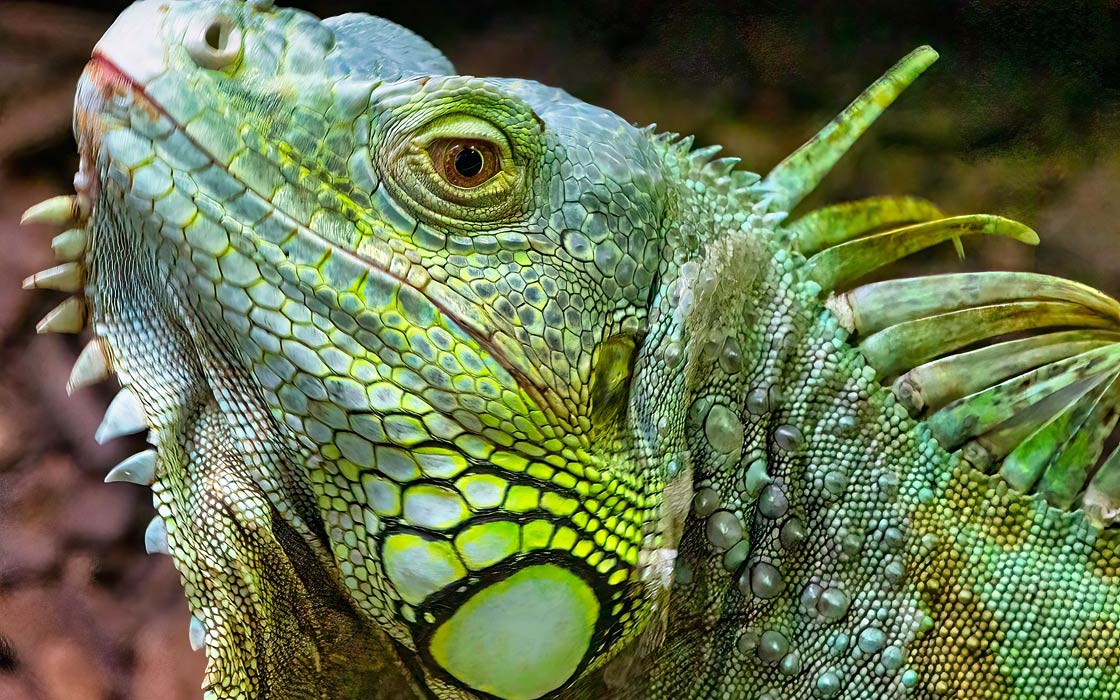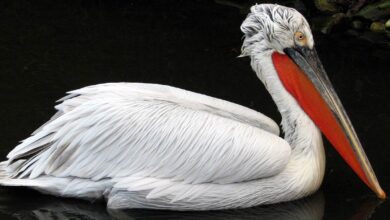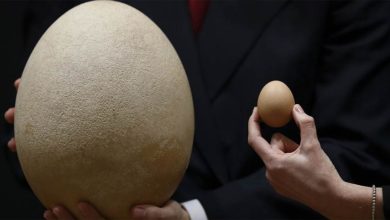Iguanas
There are many interesting facts about iguanas, such as that they burrow underground and, in Florida, are an invasive species. Whether or not you’ve seen iguanas roaming around on your property, you’ll likely be surprised to know that iguanas have three eyes. This fact catches many off guard simply because when seeing an iguana in person or a photo, there are two eyes. However, the third eye, known as the parietal eye, is an organ on top of its head. It’s not the same as the other two eyes, though its purpose is fascinating.
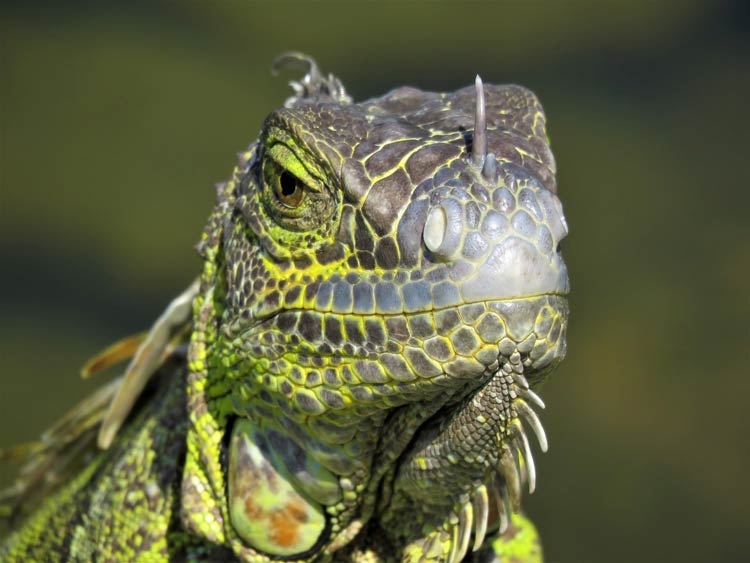
What the Parietal Eye Is and Where It Is Located
As mentioned, the parietal eye is essentially a third eye that iguanas have on top of their heads. It is a photosensitive organ that helps them detect certain changes, such as in light and movement. This third eye may help them detect predators as well as navigate around their environment. While it isn’t a true eye in the sense of what eyes typically are, as it doesn’t form images, it is very useful to these creatures.
Iguanas aren’t known for having large eyes in the first place, and their third eye is much smaller than their pair of eyes on the sides of their heads. The third eye features a covering that makes it hard to notice. It’s quite likely that you’ve looked right at an iguana’s third eye before without realizing what it was.
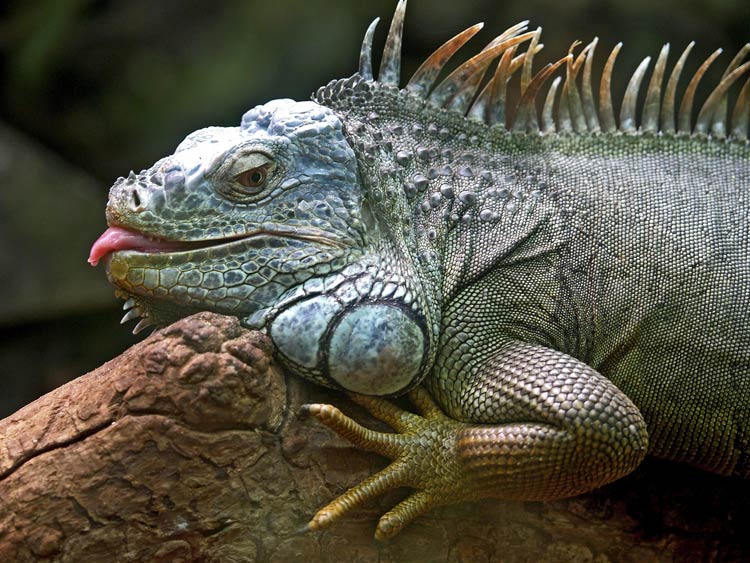
Dissecting the Parietal Eye
The parietal eye is merely a part of the epithalamus, which can further be classified into two parts. The epiphysis is the pineal gland, and then there is the parapineal organ, better known as the third eye. Old fossils of vertebrates reveal that the skull sockets once held a functional third eye. While the socket remains between the parietal bones in today’s amphibians and reptiles, it has disappeared completely from birds and mammals.
How Do Iguanas Use the Third Eye?
Iguanas rely on their third eye on top of their heads to help them detect predators, or to get away from you if you’re trying to make it leave your yard. However, the parietal eye is an exceptional tool for these lizards when an imminent attack is coming from above, such as in the case of birds. It also helps iguanas regulate their circadian rhythm, the internal body clock, and is believed to help them navigate.
Since iguanas are an invasive species in Florida, they can be trickier to get rid of with this extra eye. Iguanas burrow underground, creating networks of tunnels that most homeowners and business owners don’t notice until it’s too late. These underground burrows are also where the females lay their eggs, and navigation is essential in helping them know where to go through the tunnels they’ve dug.
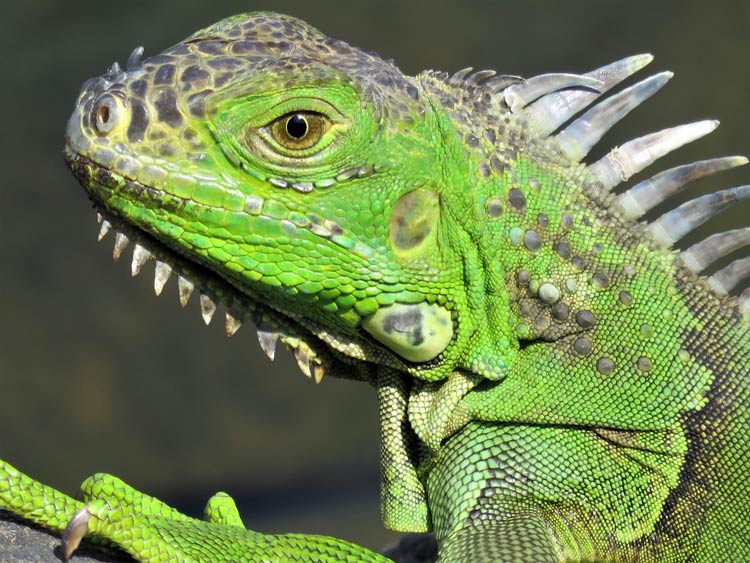
Do Any Other Animals Have Three Eyes?
Iguanas aren’t the only creatures that are blessed with an intuitive third eye that can help them sense danger and changes in light. Other amphibians and reptiles have this advantage too, as well as some fish. It is mostly a primitive feature that some animals have retained while others have not, which is certainly a mystery of evolution.
How Could Iguanas Use the Parietal Eye for Causing Harm?
Iguanas are certainly interesting animals, however, the last place you want to see one is in your yard. These creatures aren’t lone roamers either. When you see one, you should assume that there are many more of them lurking beneath the surface.
Green iguanas may be invasive, but certain animal cruelty laws in place provide them with protections. It is best to call an expert for iguana removal services if you see one or more of them running around.
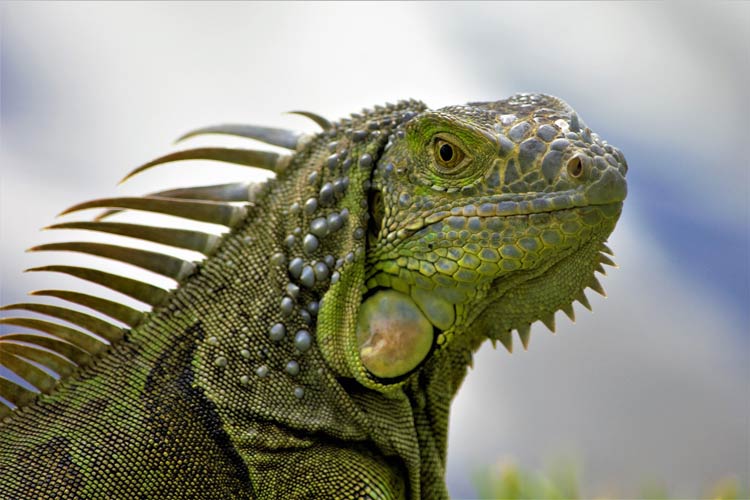
If you don’t, they could cause serious damage, including:
Destruction of Landscaping
You may have spent a small fortune trying to keep your garden and landscaping looking lush and inviting, only to have iguanas treat it like a buffet. They will devour your plants, flowers, and fruits, and as they do, they’re depriving native wildlife of the opportunity to eat, causing chaos in the local ecosystem.
With more iguanas, the less native plant species are around, causing a ripple effect for other animals that depend on these plants. While they are typically herbivores, they are also known to snack on eggs they find. Bird eggs or reptile eggs, it does not matter to the iguana. When they gobble up eggs of native species, they upset the tender ecological balance.
Structural Decimation
The parietal eye may help iguanas navigate, which is a useful tool for their burrowing habits. Iguanas dig an extensive network under the surface, and you would be none the wiser until these burrows cause the collapse of a structure on your property.
Iguanas notoriously destroy seawalls, pool decks, sidewalks, and building foundations. This is why any residential or commercial property owner must have a professional quickly investigate and assess the land. Failing to stop the tunneling of iguanas can lead to safety risks for anyone on the property, and can also result in expensive repairs.
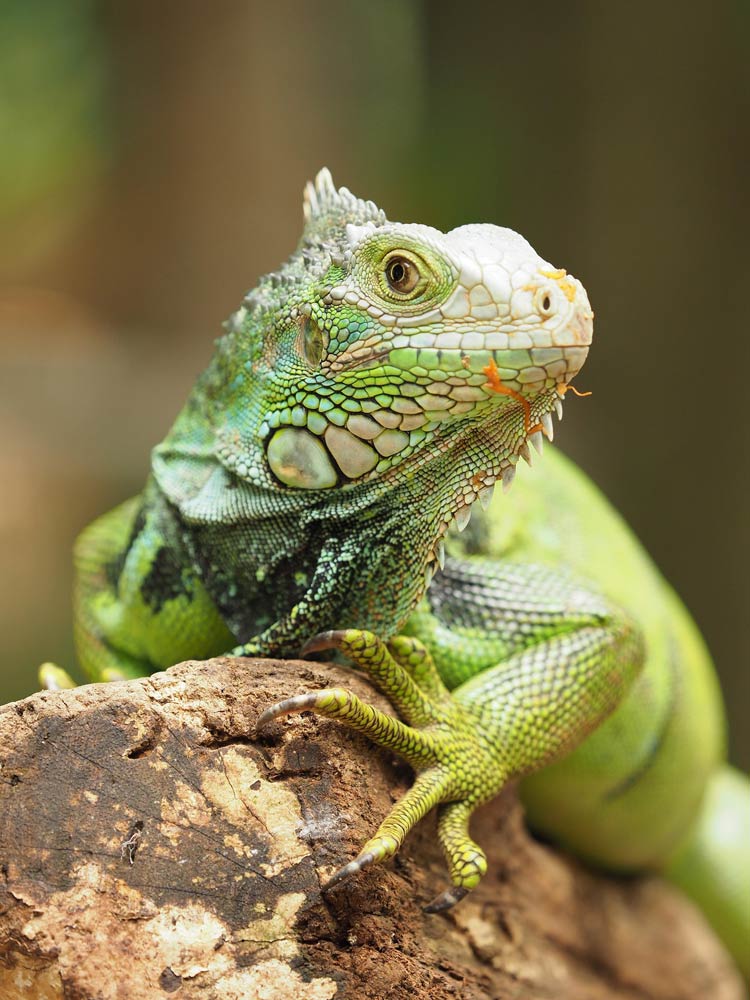
Electrical Damage
Floridians rely heavily on electricity to keep their air conditioners humming along, especially on the hottest days of the year. Green iguanas may burrow, but they also make themselves right at home from above, hiding in tree limbs and other tall structures. As cold-blooded creatures, they enjoy the warmth emitted from power lines and transformers.
Naturally, this becomes an issue when iguanas damage these power sources, forcing officials to scramble and make repairs to the infrastructure. This causes inconveniences as well as financial losses in terms for residents and business owners alike.
Potential Spread of Illnesses
By now, you might be wishing for a third eye of your own to detect iguanas so you can stay far out of their way. Another reason you’ll want to be sure your property is iguana-free is due to the droppings they leave behind. Not only does it smell horrific, but it also carries salmonella.
When iguana droppings are present, the salmonella that those droppings can contain can easily get into water. If you happen to touch a surface that has been tainted by these droppings, you could wind up becoming ill from this bacteria.
How Do You Stop an Iguana with Three Eyes?
No matter how many eyes an iguana has, stopping their invasion requires involvement at all levels. Whether you’re a homeowner or business owner, or both, knowing the steps you can take to curb iguana destruction will make South Florida a better place.
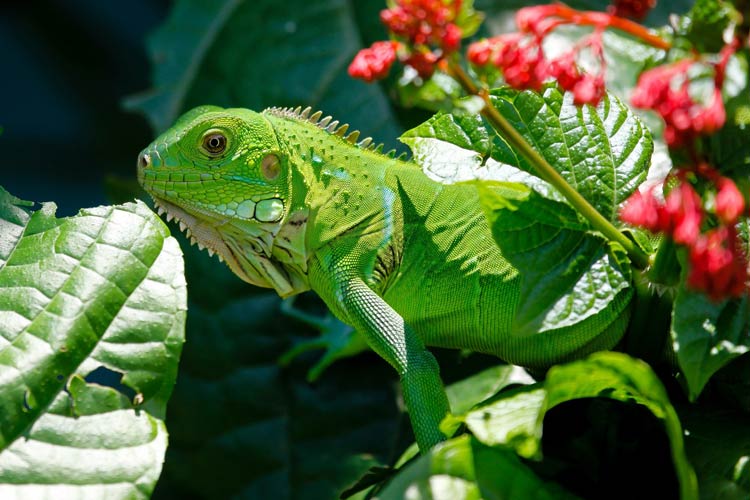
Take these steps to stop iguanas from overrunning the place:
Obey Restrictions When Bringing Home Gifts from Other Countries
When you travel abroad, you’ll likely be asked to declare any plants, including fruits or vegetables, when returning home. You may have grown fond of a few new foods on your travels, though you should never bring these items home with you. Iguanas like to hide in them, and you may have a stowaway. Stick to keychains and other types of items to remind yourself of your travels.
Update Your Garden
Certain plants are known to attract iguanas, and if they’re in your garden, you’ll be replanting and fixing it constantly. You’ll also be unintentionally inviting the iguanas to call your yard home. Instead, swap it out for the things iguanas find less palatable. Usually, anything that has a strong scent or tough leathery leaves is a hard pass from the iguanas.
Chenille, citrus trees, and bromeliads are just a few that may keep them away. Your landscaper can also help with suggestions that make your yard look lovely without inviting iguanas to start their own garden party.
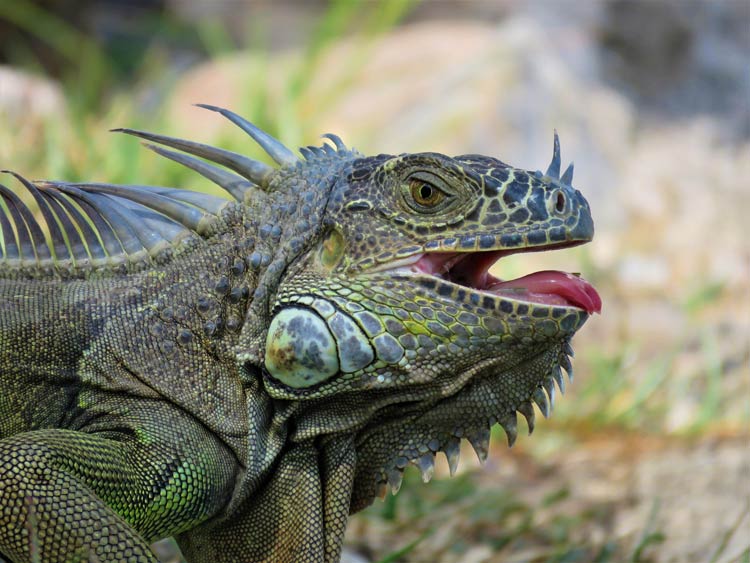
Look for Holes and Fill Them
Living in South Florida requires staying on top of your yard maintenance. Even if you hire someone for the job, make sure you take frequent walks throughout the property and keep an eye out for holes. These are a telltale sign that you have iguanas burrowing underground. You can fill those holes with rocks to discourage their tunneling.
Make Noise
Iguanas may like to party in your yard, eating up all your fruits and flowers. However, they hate certain noises, and you may be able to naturally scare them off by hanging up wind chimes. The random way in which they make noise strikes all the wrong chords for these lizards and scares them away.
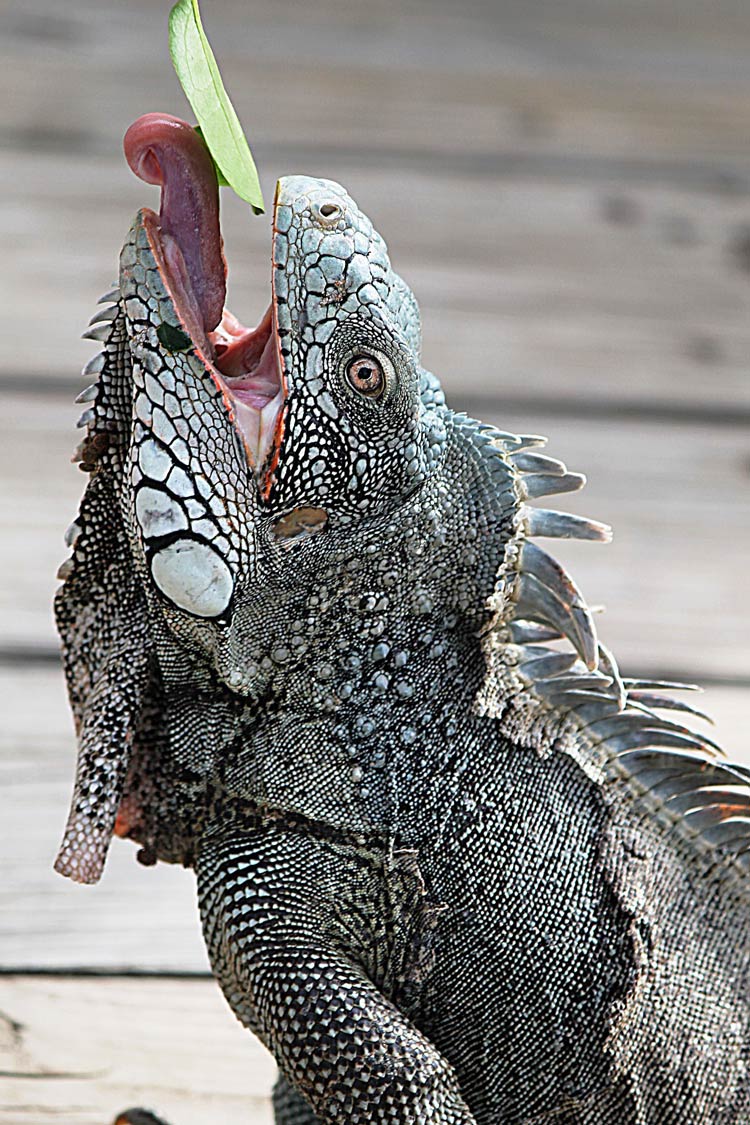
Add Mirrors or Use Reflective Materials
Perhaps as interesting as learning iguanas have a third eye is that they do not like to see their reflections. Hang items that will reflect their images back at them, and they’ll run off when they catch a glimpse.
Use Your Hose
Since iguanas can swim and enjoy being in the water, you might not realize that your garden hose can help. While they like swimming, they hate being sprayed by water. If you see them while you’re watering your plants and flowers, turn the hose on them.
Follow these tips, and if you still notice them hanging around, make sure you call a professional to stop their invasion.

